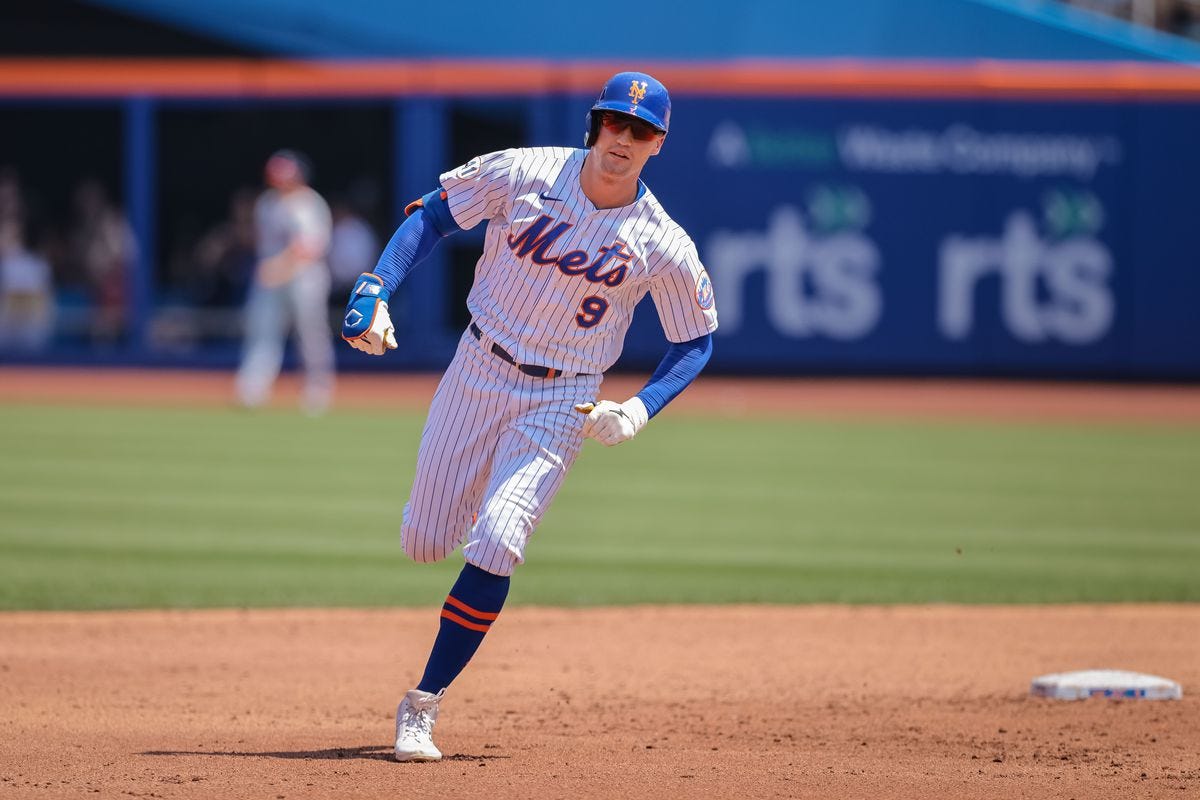Better Late Than Never
They're too late to get a discount, but the Mets still have time to lock up Brandon Nimmo long-term.
It’s the most basic principle of investing, the thing they teach you on the first day of stockbroker school: buy low, sell high. It’s the definition of finding value, and it applies to baseball players just as well as Tesla stocks. If you’re an owner and you want to build the best team possible with limited resources, you sign players who are undervalued. Then, once they improve to their true value or better, you either keep them and have them play for you at a discounted rate, or trade them at the height of their value for other players who are themselves undervalued.
You buy low and sell high and everybody knows it — but it’s too bad the Mets never applied that logic to Brandon Nimmo. He’s entering his final year of team control, and despite the many opportunities the Mets have had since 2018 to sign him to an extension at a steep discount, Nimmo seems likely to hit the open market. The Mets may well only have one year left of their best on-base threat since David Wright.
Let the record show that I’ve been beating this drum for years. For about two years and one and a half months, to be exact. In December 2019, I wrote a column entitled “The Mets shouldn’t trade Brandon Nimmo; they should extend him.” Nimmo was coming off an injury-plagued but still strong 2019 season; the injuries depressed his value, and the Mets could have swooped in to take advantage. At the time, Jeff Euston of Cot’s Baseball Contracts told me that Nimmo might agree to a five-year, $35 million extension.
“Buying low has obvious appeal for the Mets,” he told me. “As everyone can see when he's healthy, the talent is there, especially with the bat. Almost any extension, at any length, would likely deliver significant surplus value for the club.”
Well, the Mets didn’t buy low, and look what’s happened since. Since the start of 2020, Nimmo has batted .288/.402/.454. He’s been worth 5 WAR in 147 games. He’s even improved his defense: he went from -4 Outs Above Average in 2020 to +4 in 2021. If he can repeat that performance in 2022, he’ll have set himself up for a nine-figure contract in free agency. If the Mets lose him, they’ll be losing one of the most effective leadoff hitters and on-base threats they’ve had in decades.
Interlude: yes, Brandon Nimmo is good. It’s been obvious for years. His career OBP is .393; he’s a solid defender and hits for some power. Some people — not many, but some — are still on the “he’s a fourth outfielder!” train, but…he’s not. He’s a good player. That’s that. It’s settled. End of interlude.
Theoretically, the Mets could still sign Nimmo to an extension before he hits the open market, assuming the lockout eventually ends. His injury history might be enough to somewhat depress his price, which could be an opportunity for the Mets to find surplus value; unfortunately, it might also push Nimmo towards betting on himself, playing out the season, and testing the market. The Mets haven’t shown any signs that an extension for Nimmo is a priority, and they’ve made so many moves already that locking up Nimmo seems unlikely.
Here’s the good news, though: “buy low, sell high” only applies to teams with limited resources. Is that the Mets? It used to be, but with the enormous offseason the Mets had before the lockout, budgeting doesn’t seem to be much of a concern for the Steve Cohen administration. If ownership is willing to devote functionally unlimited resources to building the best team possible, it doesn’t really matter that Nimmo’s value will no longer be discounted; Cohen can simply pay Nimmo’s market price and then some. That’s the kind of thing that happens when a team gets a new multibillionaire owner: instead of “buy low, sell high,” the front office can simply focus on “good players.” It would have been nice if the Mets had locked Nimmo up after 2019, and now had several extra years of team control at a bargain rate. But if Steve Cohen is happy to pay full price, he should be able to keep Nimmo and build a dominant team around him regardless.
Nimmo’s full market price might be an “overpay.” That’s exactly why the Mets should have extended him years ago. But an overpay is only a bad thing if you’re worried about your budget, and so far, Steve Cohen seems not to be. The Mets should only ask themselves one question: in 2023 and beyond, will the roster have three outfielders better than Brandon Nimmo? If the answer is no — and the answer is, in fact, no — then they should lock him up as soon as possible, “buy low” be damned.


